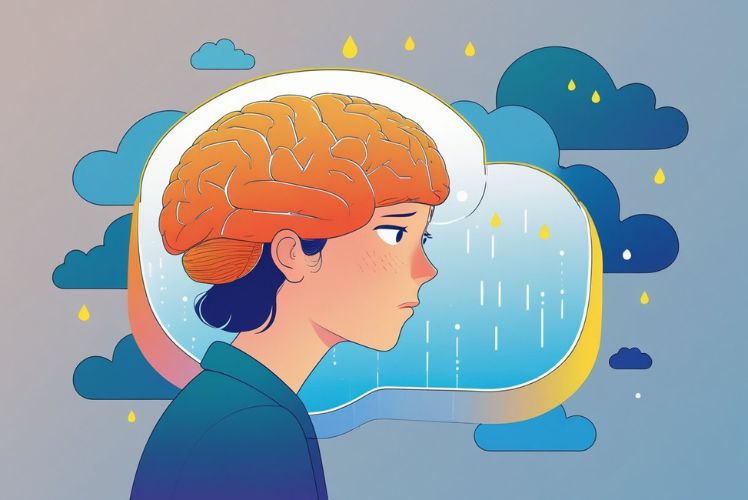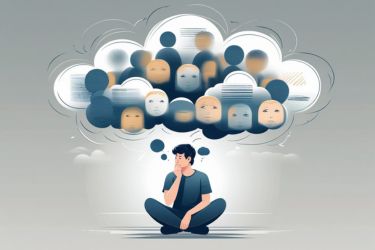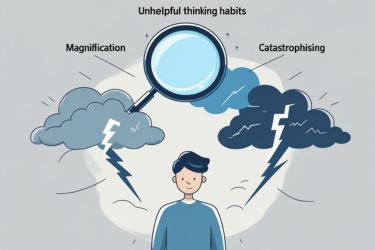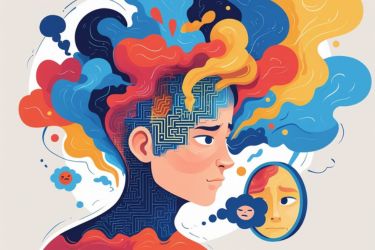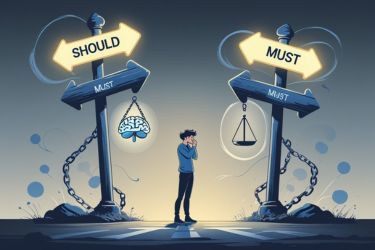Unhelpful thinking habits can significantly affect our daily lives, shaping how we view ourselves and our experiences. One of the most common patterns is known as the mental filter. This thinking style causes us to focus solely on the negative aspects of a situation while ignoring the positive. Recognising and addressing this habit can lead to improved emotional well-being and a more balanced perspective.

As we explore the concept of the mental filter, we will discuss its impact on our thoughts and feelings. By understanding how this cognitive distortion operates, we can begin to challenge unhelpful thoughts that may plague us during stressful times. Learning to shift our focus can enhance our resilience and overall mental health.
Join us as we uncover practical strategies to move beyond the mental filter and develop healthier thinking patterns. By changing our mindset, we can improve our outlook and foster greater positivity in our lives.
Key Takeaways
- The mental filter focuses on negative details, leading to skewed perceptions.
- Overcoming this habit can improve our emotional well-being.
- Practical strategies can help us develop healthier thinking patterns.
Understanding Unhelpful Thinking Habits

Unhelpful thinking habits often colour our perception of reality. By understanding these habits, we can explore their origins and the ways they affect our mental health. Let’s break down what these thinking styles are and why they matter.
Defining Unhelpful Thinking Styles
Unhelpful thinking styles, also known as cognitive distortions, are patterns of thought that negatively affect how we assess situations. These styles can lead us to interpret events in a way that reinforces negative feelings. For example, a common distortion is "mental filtering," where we focus solely on the negative aspects of a situation while ignoring the positives.
This selective focus can result in a skewed worldview. It may cause us to feel hopeless or inadequate. By recognising these patterns, we can challenge and change our thoughts for a healthier perspective.
Origins of Cognitive Distortions
Cognitive distortions often develop from past experiences, especially during formative years. Many of us may have been influenced by critical remarks or negative situations. These experiences can create lasting beliefs about ourselves and the world around us.
Cognitive theories suggest that these distortions emerge to help us cope with discomfort. However, they can become automatic, leading to persistent negative thinking. Understanding their origins allows us to address these thoughts more effectively.
How Thinking Styles Impact Mental Health
Our thinking styles play a crucial role in our mental health. When we engage in unhelpful thinking patterns, we may experience increased anxiety, depression, or stress. These thoughts can cloud our judgment and prevent us from making rational decisions.
For instance, if we constantly filter out positives, we may overlook our achievements or support from others. This can lead to isolation and worsened mental health. Recognising and altering these thinking styles can be pivotal in enhancing our emotional well-being and fostering a more balanced mindset.
Mental Filter: What It Is and How It Works

Mental filtering is a common cognitive distortion that can skew our perception of reality. It leads us to focus on negative aspects while ignoring the positives. This section will explore how to recognise mental filtering, its key characteristics, and how it compares to other cognitive distortions.
Recognising Mental Filtering in Everyday Life
We often encounter mental filtering in our daily experiences. For instance, after receiving feedback, we may dwell on one negative comment while overlooking many positive ones. This habit can lead us to feel demotivated or anxious.
Common signs include:
- Focusing on one mistake and ignoring successes.
- Discounting compliments or positive feedback.
- Ruminating on negative events, making them seem larger than they are.
Recognising these patterns is essential. By identifying moments when we filter out positive information, we can work towards a more balanced perspective.
Key Characteristics of the Mental Filter
The mental filter has specific traits that make it distinct. First, it involves selective attention. We choose to focus on certain details while dismissing others. This often happens unconsciously.
Key characteristics include:
- Amplifying negativity: We magnify negative experiences, making them feel overwhelming.
- Minimising positives: Positive events and feelings are downplayed or ignored.
- Impacts on mood: This thinking can lead to feelings of sadness, inadequacy, or anxiety.
Understanding these characteristics helps us to identify when we are using a mental filter, which can be the first step towards changing this habit.
Mental Filtering versus Other Cognitive Distortions
Mental filtering is just one of many cognitive distortions. It can sometimes be confused with related distortions like overgeneralisation or black-and-white thinking.
Key differences include:
- Scope: Mental filtering is specifically about focusing on negatives and dismissing positives, while overgeneralisation involves drawing broad conclusions based on a single event.
- Rigidity: Black-and-white thinking presents situations as all good or all bad. In contrast, mental filtering allows for some positives but ignores them.
Recognising these distinctions enables us to better understand our thought patterns and take steps towards healthier thinking habits.
The Impact of Mental Filters on Wellbeing

Mental filters can greatly affect our wellbeing. They shape how we see ourselves and our interactions with others. This section will explore the effects of mental filtering on self-esteem, mood disorders, and negative emotions.
Effects on Self-Esteem and Emotional Wellbeing
Mental filters often lead us to focus on the negative aspects of our lives. This may cause us to overlook our achievements and positive qualities. As a result, we might develop low self-esteem.
When we consistently filter out the good, we may start to internalise negative thinking patterns. We may disregard compliments or focus solely on criticism, reinforcing feelings of inadequacy. This cycle can make us feel unworthy, impacting our emotional wellbeing and increasing our anxiety.
Mental Filter and Mood Disorders
Those who struggle with mental filters are more likely to experience mood disorders, such as depression. When we filter out positive experiences, we can reinforce a bleak outlook on life. This negative perception can lead us to feel hopeless.
Anxiety can also be affected by mental filtering. When we focus exclusively on perceived threats or failures, we create a heightened sense of worry. This can lead to a constant state of unease, making it difficult to enjoy everyday life.
Relationship Between Mental Filtering and Negative Emotions
Mental filtering is closely tied to negative emotions. By concentrating on what we do wrong, we amplify feelings of sadness, anger, or frustration. This can lead to a cycle of negativity that is hard to break.
We often find that when we embrace mental filters, we struggle to experience joy. This hinders our ability to connect with others, as we might withdraw from social situations. Ultimately, the combination of negative emotions and poor self-image affects our relationships and overall happiness.
Related Unhelpful Thinking Habits

In this section, we will explore specific unhelpful thinking habits that can affect our mental well-being. These patterns often intertwine and can reinforce negative thought processes. Understanding these related habits can help us recognise and manage them more effectively.
All or Nothing Thinking and Black and White Thinking
All or nothing thinking involves viewing situations in extremes. We might see ourselves as either total successes or complete failures. This can lead to disappointment and frustration when we inevitably fall short of perfection.
Black and white thinking is similar, and often used interchangeably, as it dismisses the grey areas in between. We overlook the nuances, which can distort our perception of reality. It’s important to challenge these thoughts by seeking evidence for a more balanced perspective.
Catastrophising, Magnification, and Minimising
Catastrophising is the tendency to imagine the worst possible outcome in any situation. When we catastrophise, we blow events out of proportion. This habit can create anxiety and stress.
On the other hand, magnification involves exaggerating the impact of a negative event, while minimising downplays our achievements and positive aspects. Both can leave us stuck in a negative loop. To combat this, we should aim to assess all outcomes realistically, recognising both positive and negative aspects.
Jumping to Conclusions, Fortune Telling, and Mind-Reading
Jumping to conclusions happens when we assume we know what others are thinking or that events will turn out poorly without any solid evidence. This can include fortune telling, where we predict negative outcomes, or mind-reading, where we believe we understand others' thoughts without their input.
These habits can lead to misunderstandings and unnecessary worry. Challenging these assumptions can lead to better communication and less anxiety about uncertain situations. We can improve our thought patterns by seeking clarity directly from others.
Personalisation, Labelling, and Blaming
Personalisation refers to taking responsibility for events outside of our control. We often blame ourselves for things that go wrong, impacting our self-esteem.
Labelling involves assigning broad, negative labels to ourselves or others, which can limit our view of ourselves and others. Blaming shifts responsibility onto others, preventing us from addressing our own actions and thoughts. Recognising these patterns is crucial. We must learn to take a balanced view that accepts responsibility while also understanding external factors.
Overcoming the Mental Filter: Practical Strategies
By using effective strategies, we can learn to overcome the mental filter that skews our perceptions. These methods allow us to recognise distorted thoughts, enhance emotional awareness, and build resilience.
Cognitive Behavioural Therapy and Challenging Negative Thoughts
Cognitive Behavioural Therapy (CBT) helps us identify automatic thoughts and cognitive distortions. This approach, developed by Aaron Beck, teaches us to challenge these thoughts.
In practice, we can use techniques like the ABC model:
- A - Activating event (what happened)
- B - Beliefs (what we think about it)
- C - Consequences (how we feel and act)
By analysing these steps, we start recognising patterns in our thinking. We can then replace negative thoughts with more balanced ones. This change helps us see the whole picture instead of just the dark parts.
Mindfulness and Emotional Awareness
Mindfulness is a powerful tool that encourages us to be present in the moment. It allows us to observe our thoughts and feelings without judgment.
We can practise mindfulness through techniques such as:
- Breathing exercises: Focus on your breath to anchor yourself.
- Guided imagery: Visualise calm settings to create a positive mental space.
- Body scans: Notice physical sensations to connect with our emotions.
By practising mindfulness, we learn to detach from distorted thoughts. This awareness enables us to see situations more clearly and recognise when the mental filter is at play.
Building Resilience and Positive Thinking Patterns
Building resilience involves developing a positive mindset and coping strategies when faced with challenges. We can foster this by:
- Setting realistic goals: Break tasks into smaller, manageable steps.
- Practising self-compassion: Be kind to ourselves when we make mistakes.
- Surrounding ourselves with support: Connect with friends or groups who encourage positive thinking.
Implementing these strategies allows us to replace unhelpful thinking patterns with more constructive ones. Gradually, we create a mental environment where optimism can flourish, helping us combat the effects of the mental filter.
Frequently Asked Questions
In this section, we will explore specific aspects of mental filtering. We will address common situations where it appears, ways to challenge it, and how it shapes our perceptions of reality.
What are some common instances of mental filtering in everyday thinking?
Mental filtering often occurs when we focus intensely on negative events while ignoring positive ones. For example, after receiving several compliments, we might fixate on one criticism. This can lead us to believe that we are not performing well, despite evidence to the contrary.
How can one challenge and alter unhelpful cognitive patterns?
To challenge these patterns, we can start by questioning our thoughts. This involves asking ourselves if the negative thought is based on facts or if it is exaggerated. Keeping a journal can also help us track these thoughts and identify patterns we need to change.
In what ways do mental filters distort one's perception of reality?
Mental filters can create an inaccurate view of our experiences. By only noticing negative aspects, we may start to believe that things are worse than they actually are. This distortion can affect our mood, relationships, and decision-making.
Can you outline the steps to identify when one is using a mental filter?
We can identify mental filtering by paying attention to our thoughts and feelings. Noticing when we feel particularly upset or anxious can signal a mental filter in action. We should then reflect on whether our thoughts are capturing the full picture or just a narrow, negative part.
How does mental filtering differ from other cognitive distortions, such as discounting positives?
While both involve an inaccurate view of reality, mental filtering focuses on negative inputs over positive ones. In contrast, discounting positives specifically means rejecting good experiences as unimportant. Both can harm our emotional well-being, but they operate in slightly different ways.
What strategies can be employed to cultivate a more balanced thinking style?
To cultivate balanced thinking, we can practice gratitude by regularly listing things we appreciate. Engaging in positive self-talk and challenging negative claims about ourselves are also effective. Additionally, seeking feedback from trusted friends can help provide perspective and counteract mental filters.

